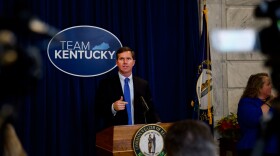Kentucky lawmakers will consider overriding vetoes issued by Gov. Andy Beshear and pass any last-minute bills when they reconvene for the final two days of the legislative session on Tuesday and Wednesday.
The to-do list for the Republican-led legislature includes deciding whether to override Beshear’s veto of the controversial voter ID bill, whether to confirm Beshear’s appointments to the state Board of Education and considering constitutional amendments that don’t require the governor’s signature.
The legislature will also consider overriding line-item vetoes Beshear made to the budget and revenue bills on Monday afternoon.
In a statement, Beshear said he didn’t veto specific spending items, but only language that would limit his flexibility during the coronavirus pandemic.
“Right now and in the coming weeks and months we need everyone to continue making sacrifices and doing their part as a member of Team Kentucky to fight the coronavirus to limit the spread and save thousands of fellow Kentuckians,” Beshear wrote in a statement.
Beshear rejected dozens of parts of the tax and spending plans. One of the vetoes in the revenue bill would eliminate language giving Kentucky Secretary of State Mike Adams power to approve or deny the governor’s changes to election proceedings during a state of emergency.
Beshear vetoed the measure saying it would, “for the first time require the approval of the Secretary of State in addition to the Governor…before changes to an election may be made during a declared state of emergency.”
Beshear also eliminated language in the budget bill giving Kentucky Treasurer Alison Ball the power to approve out-of-state travel for cabinet secretaries on the state aircraft.
“This responsibility bears no relationship to the important duties of the State Treasurer and is more capably handled by the existing state laws,” Beshear wrote in his veto message.
Unlike Congress, where it takes a two-thirds majority to override a president’s veto, it only takes a simple majority of lawmakers in each legislative chamber to override a Kentucky governor’s veto.
The last day the General Assembly is allowed to meet is April 15, after which they won’t have opportunities to override any additional vetoes issued by Beshear.
Voter ID
Senate Bill 2 would require voters to show an ID in order to cast a ballot starting with this year’s General Election, though it would also allow people to use credit or Social Security cards to prove their identities as long as they sign a form saying they had a “reasonable impediment” to obtaining a photo ID.
Beshear vetoed the bill earlier this month, arguing that it would reduce access to the polls, especially during the coronavirus pandemic when offices where people can obtain ID’s are closed.
The proposal has been a top priority for Republican Secretary of State Michael Adams, who argues that it would reduce voter fraud. Earlier this month, Adams called on lawmakers to override Beshear’s veto.
“I ask the legislators of both parties who believe in election integrity and passed this law to override this regrettable veto, and I hope the Governor will eventually join me in governing from the center,” Adams wrote in a statement.
There are no documented cases of in-person voter fraud in Kentucky.
The League of Women Voters of Kentucky called on legislators to sustain the veto, saying the bill would prevent some eligible citizens from casting ballots.
“It is imprudent to require those without a photo ID to secure one prior to the November election given the uncertainties posed by the COVID-19 epidemic,” a statement from the organization read.
Board of Education Appointments
The Kentucky Senate will decide whether to confirm Gov. Beshear’s appointments to the state Board of Education after Beshear totally replaced the board as one of his first moves in office.
Beshear’s reorganization of the board has drawn backlash from Republicans who argue the new board doesn’t have enough GOP members.
Under state law, if the Senate doesn’t confirm Beshear’s appointments, Beshear will not be able to reappoint them, though he would be able to appoint new members.
Senate Republicans have been critical of Beshear’s education board actions, although a bill tweaking the governor’s power to reorganize the panel is unlikely to pass into law this year.
Members of the previous Board of Education appointed by former Gov. Matt Bevin have sued Beshear over his reorganization, though requests to block the move have been denied so far.
Constitutional Amendments
Lawmakers have proposed several constitutional amendments during this year’s legislative session, and they all still have a chance to pass since governors have no say in whether to sign or veto the bills.
Once a proposed constitutional amendment is approved by three-fifths of members in the state House and Senate, Kentucky voters decide whether to approve it during the November general election.
But only four constitutional amendments are allowed to be on the ballot each year.
Some of the proposals include “Marsy’s Law,” which would create new rights for crime victims; restoration of voting rights to some people with felony convictions and adding language to the state constitution saying that it guarantees no right for women to get abortions.
Voting During The Pandemic
The coronavirus pandemic has slowed down the legislature and stymied some priority bills, though lawmakers have met over the last month as the disease sweeps the state and country.
When they last met on April 1, the state House of Representatives adopted new rules allowing lawmakers to vote remotely by sending in photos of a ballot to designated managers on the House Floor.
The Senate has not adopted any new voting rules, though the 38-member chamber allows for lawmakers to space out more than the 100-member House.
One legislative staffer was diagnosed with coronavirus late last month but has now recovered, according to state officials.





